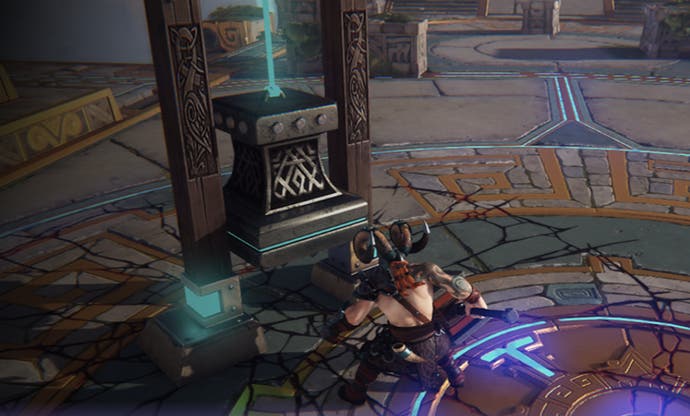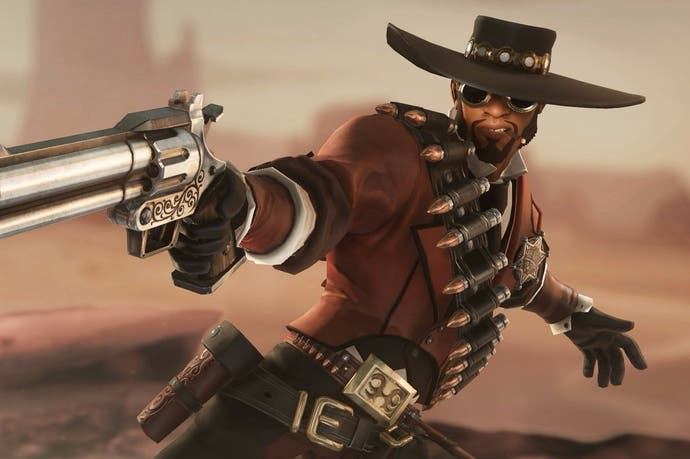Introducing Breakaway: Amazon's esports game by the Killer Instinct devs
If you build it, they will come.
Killer Instinct developer Double Helix was acquired by Amazon Game Studios shortly after the release of its free-to-play fighting game and now the developer is courting the esports market with Breakaway, a four-vs-four competitive action arena title. Revealed today at TwitchCon, Breakaway uses the dev's penchant for deep fighting systems, only this time re-appropriates towards complex team-based action.
The general gist of Breakaway is that two teams compete to bring a relic into a goal on their opponents' end of the field. There are two additional ways to win: defeating every member of the opposing team through combat, or running out the clock while the relic is on the opposing team's side of the map.
Each character can carry the relic, but it's easily dropped through a complex fighting system. How complex? Each character comes equipped with a core attack and three unique special moves tied to cooldown timers. For example, Alona, the healer, can cast a spell increasing the HP of those around her, or Spartacus' Assault can do a bunch of quick combos.
On top of that, each character can construct two "Buildables", i.e. structures that alter the properties of the map. Some of these include a healing shrine that replenishes the HP of those around them, a sun mirror that shoots beams of light at nearby opponents causing an increased rate of damage over time, a Thumper smashes the ground at regular intervals stalling the actions of those around them, and a Steamroller can plow through your opponents' Buildables quicker than regular attacks.

"The teams that invest heavily in Buildables invariably control the entire arena, so it's part of the deeper meta of the game. You can be very good at combat, you can be very good at team composition, but the team that's very good with Buildables is going to have an edge on you," says Amazon Game Studios head Patrick Gilmore in an interview with Eurogamer.
Adding further complexity to the arena sport is a slew of items one can buy with gold earned between rounds. These can increase a character's speed, armour, and attack power. Buying items unlocks better versions of them, so if you invest in the same item across enough rounds in a first-to-three match, you can unlock an item's ultra powerful fourth form.
These reset between matches though. Persistent character upgrades will be limited, as Gilmore is adamant that the studio values there being a level playing field for anyone. Most upgrades will be purely aesthetic, though there might be further customisation options available to tweak a character's stats, but this is still to be finalised.
Between Breakaway's various characters, special moves, Buildables and upgrades, the esport may sound pretty dense, but Gilmore is adamant that it's very easy to learn how to play and that everyone who's tested it has gotten the hang of it in less than a minute. Interestingly, it didn't start out this way. An earlier version of the game had a far more robust character combat system with blocking, counters, and a flurry combos. But this more robust build didn't go down to well with the less dedicated populace.

"The fighting metas were very deep," Gilmore explains. "We played that with expert players and they loved it. They dived right in. They'd dissect the moves, like those expert guys do. And they would play it with more casual players and the skill gap was just- it wasn't even a skill gap! It was like a knowledge gap. The barrier to entry was we thought really high.
"Accessibility has always been one of the key things that we wanted to drive. So then the challenge was how to you build a fighting system that is deep and learnable, but that doesn't throw up a wall at the beginning of the game. So the complexity of the game really emerges over time."
Another feature to add to Breakaway's accessibility goal is the inclusion of both a training mode and AI bots. The game will be fully playable in single-player with seven bots to practice with. You can mix-and-match the bot-to-player ratio, too, should a small group of friends want to get a feel for things before jumping in against fellow humans.
While Breakaway's system may sound convoluted, Gilmore is adamant that it's very quick to get to the action, unlike many team-based esports. That being said, it also has an healthy balance of downtime for prep between rounds. "We realised that a play-based game like football gave you time to strategise with your teammates, gave broadcasters time to talk about what they were doing, gave time to regroup or huddle in-between matches," he says. "We also changed the game field so you could see the entire field at all times. That made it really effective for strategy as a team sport. For a broadcaster streaming the game there would never be an opportunity to miss a key action."
There's a lot of smart ideas in Breakaway's peculiar mix of sports, action-RPG, strategy, and mild platforming mechanics. Whether the result of all these system will be fun in practice, we've yet to try. But Amazon Game Studios is open to whatever feedback it receives.
"They love building the game while players are playing the game," Gilmore says of the studio, who's already opened an alpha waitlist. "The idea here is as we broadcast, as we stream, as we engage with the community, we're going to do kind of what we did with Killer Instinct where there's a ton of customer feedback with people saying 'we love to play it this way' or 'we love to see this sort of character or this sort of environment.' We're excited to see players dissect the game and see where to take it from there."

